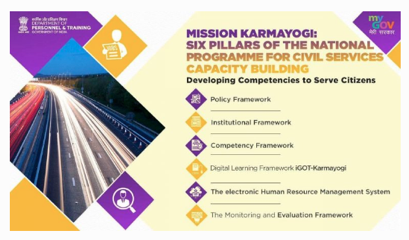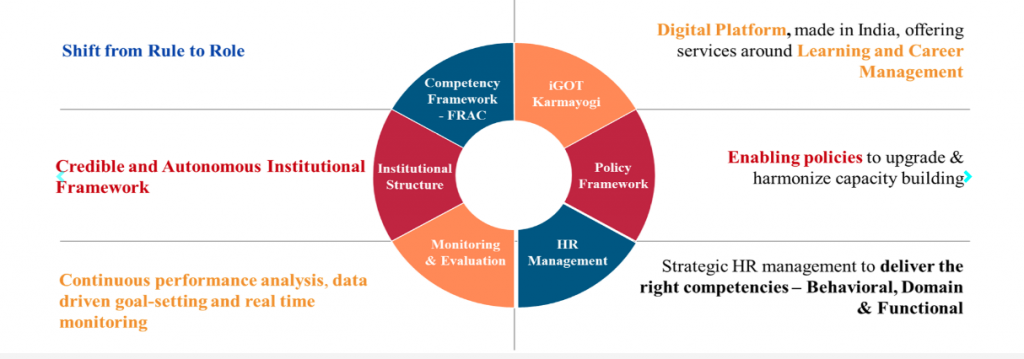ABSTRACT:
Modi strengthened the delivery of democracy by rolling out reforms of the Indian bureaucracy and public servants through Mission Karmayogi, a National Programme for Civil Services Capacity Building that aims to transform capacity building in the bureaucracy through institutional and process reforms.
The ultimate aim of Mission Karmayogi is to ensure “Ease of Living” for the common man, “Ease of Doing Business” and Citizen-Centricity that is bridging the gap between the government and the citizens.
The public sector in India is one of the largest employers and to a very large extent the quality of the welfare state, the health and well being of the nation depends on the performance of public sector employees.
Worldwide, the public sector has been pushed to make the shift from survive to thrive, calling for a focus on harnessing human strengths that enable the broader organization to flourish, as per a survey conducted by Deloitte (Human Capital Trends 2021).
Making the shift from survive to thrive depends on an organization becoming effective, efficient and distinctly human at its core. It is this human core that fostered a culture of dialogue that has been the essence and a distinct feature of Indian civilization and culture for centuries. With Modi’s governance style, dialogue and inclusiveness has been thrown once again to the forefront to deliver democracy.
Under Modi leadership, India’s political and administrative system has transformed and is geared towards empowering people and ensuring equitable development. These reforms have impacted the expectations from public servants, caused the public service organizations to look inwards, analyze and introspect about the gap between intended and actual impact including the need to demonstrate accountability, and improve service quality delivery to the citizens.
For several decades Indian bureaucracy stood neglected and under-served. Its employees often lacked a sharp understanding of their roles and its impact, tools, competencies, and skills that are needed and used to be effective in their role. At the same time, the leadership had limited insight into the skill gaps of individuals they lead and their organizational units as a whole. Combined together these had led to a burnout and lethargy impacting morale, productivity, and overall engagement of the employees in public service delivery and indirectly democracy. The recent worldwide economic downturn due to COVID-19 exposed newer fault lines and heightened the need to tie in human capital with organizational performance through capacity building and strengthening to serve the nation.
Historically, the second Administrative Reforms Commission and the National Training Policy, 2012 strongly suggested adoption of competency-based approach to the entire gamut of human resource management, including capacity building of civil services. The Department of Personnel & Training (DoPT) developed a Competency Dictionary for the Indian public services and a tool-kit for its implementation. The four set of basic features have been categorized as Ethos, Ethics, Equity and Efficiency.
While there is a general agreement that public services play a decisive role in discerning and appropriately acting in a manner that builds trust and legitimacy, the context, content, process and outcomes of public-sector leadership seem to have rusted and frayed leading to the need for this new reform.
“When India grows, the world grows. When India reforms, the world transforms’s, PM Modi said in the 76th annual UNGA in Sept, 2021. As the Indian economy grows, it will get more complex to govern; the governance capacities will have to be enhanced proportionately which this reform undertakes. Hailed as the biggest bureaucratic reform ‘Mission Karmayogi’ is India’s capacity-building scheme for public servants aimed at offering post-recruitment functional and sectoral training of employees at all levels and job families.
The mission is delivered digitally through a platform called iGOTKarmayogi. Empowered with specific role-competencies, a civil servant will be able to ensure efficient service delivery of the highest quality standards. The platform will act as a launchpad for the National Programme for Civil Services Capacity Building (NPCSCB), which will enable a comprehensive reform of the capacity building apparatus at the individual, institutional and process levels.

PM Modi has floated a series of governance reforms since 2014. It was after much deliberation in his address at Kevadia, Gujarat last year, he said, “Every effort made with impartial and selfless spirit is the strong foundation of New India. To fulfill the dream of a New India, 21st century thinking and dreams are indispensable in our bureaucracy – a bureaucracy that is creative and constructive, imaginative and innovative, proactive and polite, professional and progressive, energetic and enabling, efficient and effective, transparent and tech-enabled” and there in was born Mission Karmayogi.
The mission has been designed to address gaps and unlock the potential of public servants and services, whilst transforming the work culture in government, eliminating department and service-based silos and strengthening government institutions and processes. Primarily, the need to develop domain knowledge besides administrative capacity in the bureaucracy.

To cover around 46 lakh central employees, a sum of Rs 5110 million will be spent over a period of 5 years from 2020-21 to 2024-25. The expenditure will be partly funded by multilateral assistance to the tune of $50 million and will be governed by a Special Purpose Vehicle.
Mission Karamyogi’s competency framework serves as the bedrock for processes like recruitment, talent induction, management development, appraisals, succession planning and career paths etc. This fits very well into the higher vision of the Indian Government led by PM Modi for its bureaucrats to be the arms that produce value for its stakeholders and the citizens at large. Besides providing continuous online training platform the iGOT platform allows all government servants from assistant secretary to secretary level to take courses from international universities.
The ultimate aim of Mission Karmayogi is to ensure “Ease of Living” for the common man, “Ease of Doing Business” and Citizen-Centricity that is bridging the gap between the government and the citizens.
PM Modi has made it clear time and again, that the shift has to be to a public values driven institutional framework that moves from intention to outcome. Mission Karamyogi’s genesis is yet another vehicle used to ensure stellar delivery of democracy to Indian citizens.
AUTHOR INFORMATION:
Simi Mishra, is a Talent Development & Learning Principal with Rambhau Mhalgi Prabodhini. She has worked with several Fortune 500 clients across the world in the talent management and change management space for 20 years.